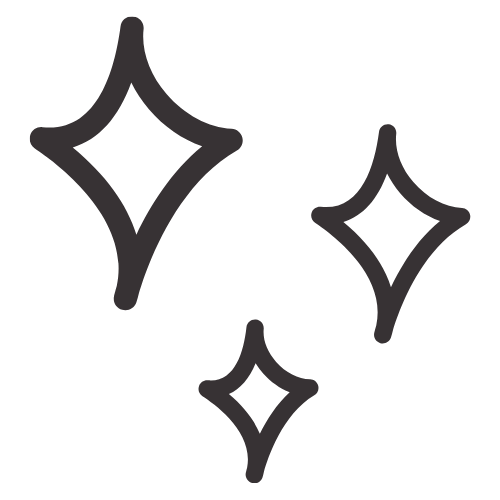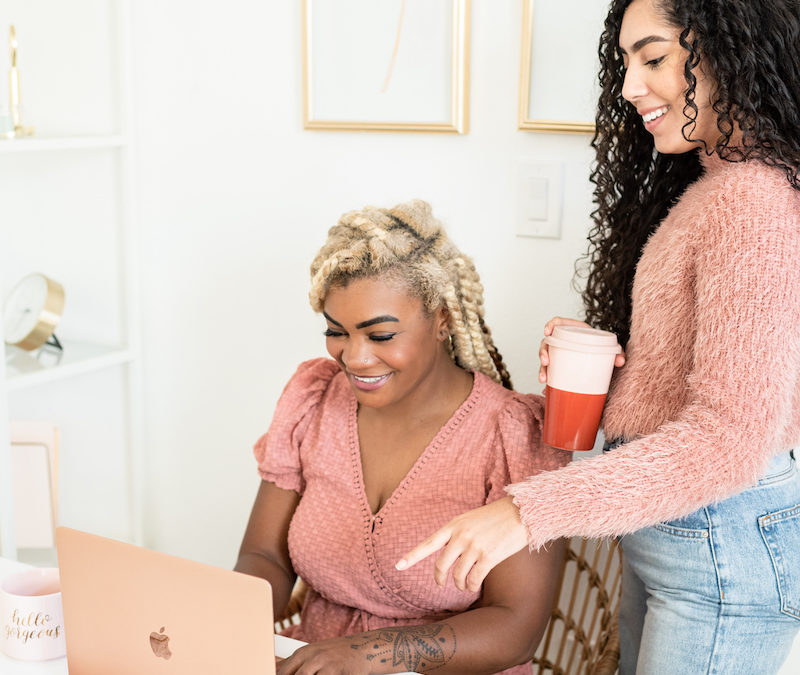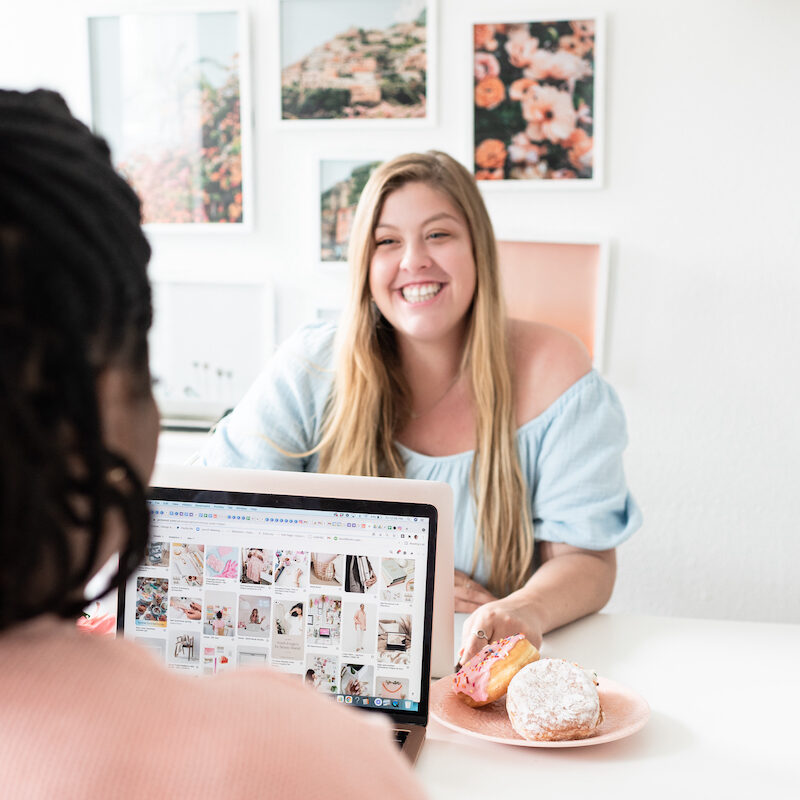episode 24
Why a Referral-Based Business is MAGICAL
Today Sam & Karyn talk about the magic of getting client referrals and how to align them with your goals for your web design business.
Episode 24: Why a Referral-Based Business is MAGICAL
Show Notes:





Episode Transcript:
Karyn Paige, Sam Munoz
Sam Munoz 00:00
This kind of goes back to the whole idea of those vanity numbers and feeling like we might need to have like 2000 followers on Instagram, let’s say, because we might think like the well of referrals is just going to dry up. And I can understand why you might feel like that. But the fact is that it’s all about the people and just continuing to cultivate relationships, cultivating your network, showing that you’re really good performing very well in projects so that people do want to continue to refer you. And if you’re not doing those things, I would understand why you might fear that that might dry up. But if you’re actively participating in your network, and you’re reminding people of your skills, and again, you’re showing up for your clients, you’re going to get referrals. That’s just how things work. And so I think that that’s a layer to it, as well as like, because my business is so based on referrals, I’m afraid that eventually I will stop getting them. But my argument to you is, is that often even working for your business. Welcome to making website magic where we empower women to step boldly into their web design businesses follow their intuition and claim the success they’re worthy of. I’m Sam Munoz.
Karyn Paige 01:12
And I’m Karyn page, where the tech wizards behind Sam Munoz consulting on the making website Magic School of Business. We’re two women here to talk about what it actually takes to run a web design business that’s aligned with your vision.
Sam Munoz 01:25
Spoiler alert, it probably isn’t what you think it is ready to hear about everything from refining your business vision, networking with intention and creating a magical client experience.
Karyn Paige 01:35
Let’s do it.
Sam Munoz 01:41
Hello, Karyn.
Karyn Paige 01:42
Hey, Sam,
Sam Munoz 01:44
how are you? On this amazing day? We’ll pretend it’s Tuesday when this podcast episode is coming out. How are you today?
Karyn Paige 01:52
Tuesdays are great. Tuesdays are one of my seven favorite days of the week.
Sam Munoz 01:59
Oh my gosh, what a positive outlook on life. I love that. Does it end in a Why then it’s my favorite day?
Karyn Paige 02:07
Yes.
Sam Munoz 02:09
I love that. Well, yeah, I am looking forward to this great conversation we’re having today about why referral based businesses are magical. I think we’re going to be doing a lot of belief shifting in this episode, really helping to have our listeners pause. Think about their businesses, where they’re finding a return on their time investment. And why if they have a business that is based on referrals, it’s actually an amazing thing. So I’m excited.
Karyn Paige 02:43
Yes, this is gonna be another fun conversation. I’m smiling from ear to ear over here. So let’s just hop right into it. Sam, why are we even talking about this in the first place?
Sam Munoz 02:56
Yeah. So I feel like the the main reason that this has kind of come to light is because we’ve been really observing conversations that we’ve been having with our mentees conversations we’ve been having in like DMS and phone calls with other web designers and developers, in terms of like, Where are you finding clients? And like, how are they coming to you and things like that? And for some reason, referral based businesses have this like, bad reputation, or it’s just something that we’re constantly trying to run from, when I think of it, I think of like, when someone asks you, Oh, where did this client come from? And you like, slink into your seat and you like, lower your head? And you say, I mean, they came from a referral. And there’s like this shame in there. And it’s To me, it’s, it’s always a little odd to say, Well, why, you know, why is there so much shame wrapped up in referral based business? And so I feel like that’s like, the main motivation is like, there’s something that we want to run from when it comes to referral based businesses. And in this episode, we’re going to be talking about why we don’t have to run from it at all.
Karyn Paige 03:57
I have so many questions, like, I hear that. And I’m like, Well, why? Well, why? Well, why, like, my inner four year old comes out, like, why I need to know more. You know, it’s like, I almost want you to keep talking, because I’m just like, Well, why, Sam, tell me more.
Sam Munoz 04:14
I think that there’s probably a lot of reasons, but some of the ones that we’ve identified are, first of all, I think that a lot of us believe that maybe our businesses start referral based that somehow a referral based business is seen as like amateur, like, I’m just getting started. So I’m just based on referrals. And then there’s like this goal to like start with a referral based business which to make, you know, pull away the jargon or referral based business is one where you are recommended by other people as your service provider, right? Someone says, I’d recommend you work with Karyn to build your website because I’ve worked with her and she’s great. Like that’s what a referral based business is. And so I feel like there’s this tendency to start there, but then be like, I got to move away as fast as possible and first Well, my question is to what? Like, what are you going to run to if you’re running away from a referral based business? And then my second question is, why is a referral based business not enough? But that’s I think that’s why they get a bad reputation in the first place is like, they’re seen as this, like starting out, like just getting started just getting my feet wet. And so I have to rely on referrals. There’s just this like, I don’t know, it’s so bizarre.
Karyn Paige 05:27
Yes, there’s this other piece of it too, about where we kind of are in the space of like, online businesses, right. And so again, taking it back to this idea that so many of us are getting generic business advice from generic online business owners, or, you know, coaches that are talking about like passive income business models, where it’s all about, like automation, and email marketing and ads or anything where you’re not directly talking to people. And so then we have like internalized Oh, well, that’s where my business, that’s where my clients are supposed to come from, they’re supposed to come from this, like through line of, I just put something out onto the internet, they saw it, they opted in, I sell to them that way. So we lean into that space. And then that’s where we’re giving all of our attention. That’s where we expect the work to come from.
Sam Munoz 06:20
And it’s like, we feel bad. If it doesn’t come from there. We’re like, Oh, my opt in must suck, because I’m only getting clients from referrals. And I’m over here, like, you must be really good at what you’re doing, because you’re only getting clients from referrals. That’s what I hear.
Karyn Paige 06:35
Right? Right. So it’s this thing about, like, really forgetting that at the center of what we do as web designers, right is working one to one with a client. It’s people who are at the center of our businesses, right? Yep. So always keeping that at the forefront of our mind. And sometimes I think we’re really forgetting, because we’re getting so distracted, and so inundated with all of this other stuff that’s like, Nope, it’s automation. It’s email marketing. And it’s like, maybe for your business model. But for our business model, it’s always centered on people. And what I mean centered on people, direct connections, you know what I mean, because email marketing, technically centered on people too, but it’s just like
Sam Munoz 07:18
it is, but it is centered on people. But it’s more about like removing yourself. And so a lot of the ads and things that I see related to, you know, passive income or like transition, your referral based business to something that is more automated has to do with removing yourself, because you’re somehow like the bottleneck. And that can be true. But it also doesn’t like there’s just so many ways to run a business. And if your goal is to work with someone and build websites for them, you don’t have to remove yourself, you can totally be a part of it, you can have a team, that’s a part of it. And it doesn’t have to be automated. And I think that there’s another layer here where there might be like a scarcity mindset going on here where we think this kind of goes back to the whole idea of those vanity numbers and feeling like we might need to have like 2000 followers on Instagram, let’s say, because we might think like the well of referrals is just going to dry up. And I can understand why you might feel like that. But the fact is that it’s all about the people and just continuing to cultivate relationships, cultivating your network, showing that you’re really good performing very well in projects so that people do want to continue to refer you. And if you’re not doing those things, I would understand why you might fear that that might dry up. But if you’re actively participating in your network, and you’re reminding people of your skills, and again, you’re showing up for your clients, you’re going to get referrals, that’s just how things work. And so I think that that’s a layer to it, as well as like, because my business is so based on referrals, I’m afraid that eventually I will stop getting them. But my argument to you is, is that often even working for your business, is sharing on social media, even working for your business. And it’s really a matter of thinking, let’s just take a pause here. Think back to the last client you worked with. How did they find you
Karyn Paige 09:09
know, this audio recording did not break down. We’re literally just took a pause, like sit with that real dark. Let’s think this thought experiment out a little bit more like okay, if you have worked with clients in the past, think about how they came to you. Did they come to you? Because of a past client recommending you? Do they come to you through an Instagram post or through an ad? It almost makes me want to like use different language like I just use the word recommend, right? Like referrals sound that sometimes can feel like really, like nebulous and enigmatic What does it What does that mean referrals, let’s talk about recommendations, right? Like how being recommended is a thing. And to bring that back. It’s like, most likely your past clients came to you because somebody have recommended you. And they follow through on
Sam Munoz 10:02
that. And there’s so many ways that that can happen, right? It can happen in like, a past client just like talking to somebody and being like, Oh, I worked with Karyn or I worked with Sam on this project, go work with them. Or it can be someone like shouting you out on a Facebook post, like there are different ways that this can happen. But I would argue that all of these things are based on referrals, right? It’s like someone recommending you someone suggesting you as the person that they should work with, or they should talk to next. And that is beautiful. That is everything. And so like, let’s talk about the value of a referral based business. So that way, maybe if we are having this like desire within ourselves to like, step away from the referral based business, like before you do that, let’s talk about all of these beautiful benefits of running a business that is truly based on centered on and values people and interactions with people.
Karyn Paige 10:55
Yeah, one of the main benefits of really like leaning into this idea of a referral based business or a business based on recommendations is that the trust is already like built in to the new connection, right? The person who’s coming to you trust the person that they heard about you from, right. If someone came to me and said, Oh, Sam recommended you to build my website. That’s because they trust Sam. So automatically, there’s a lower barrier to entry of vetting you. Yeah, absolutely. So the opposite of that might be, I just found you in like an ad or whatever.
Sam Munoz 11:36
I don’t know who you are just Google Web Designer.
Karyn Paige 11:39
Yeah. Why should I trust you to to give you four figures of my money. And I don’t even know you were as if it’s like, I was recommended to you by somebody that I really trust. And she really trusts you. Therefore, I now trust you. Yeah. And
Sam Munoz 11:57
that’s really important when we’re running businesses, where a lot of our visibility is online. Because that trust is not as easy to gain as like a physical handshake in person, like, I see that you’re a real person. And I trust you kind of just like in that physical space, when we’re online, like having someone vouch for us in that way, and say, like, we’re legit, they got me results. I enjoyed working with her. That is a gift. And it’s honestly like, if you think about it, it is showing you that you are awesome at what you’re doing. Right. So if you’re getting a bunch of referrals, why are we went running away from that, instead of saying, Oh, my gosh, I must actually be good. Like this should be a confidence boost to you,
Karyn Paige 12:43
like fully, if you’ve ever experienced like opening your email inbox. And there’s a message that comes in, where it’s like, oh, so and so recommended that I contact you because I need a website. When that has happened to me, I’m always like, Oh, my gosh, thank you, thank you for thinking of me, thank you for thinking of me, out of all the people. Let’s also not ignore the fact that that is a gift. And that’s actually like edifying you and giving you evidence that you are good at what you do.
Sam Munoz 13:15
And I just want to like be really transparent and clear about this too. Getting on a discovery call with someone who is recommended to you is a completely different experience than someone that just like dropped onto your website and booked a call with you that can also go really well too because you can still showcase your expertise on that call and all of that but you have to build the trust first and then you can like transition to that whereas when someone recommends you you’re already going in like a level up. So it’s just a matter of like formalities of like Will this work for you? Will this work for me if they got on that call after being referred to you it’s just a fitting versus trust building? And quote unquote selling?
Karyn Paige 14:01
Yes. So I want to dig into that just a little bit deeper, right? Like you kind of you said it’s like leveling up like you’re already starting, you’re not starting at level zero, you’re starting a few levels ahead. That Trust has been accelerated, right? So if we’re thinking back to what we’ve all heard about, like generic online business advice, there’s this phrase of often used words like the know like and trust factor, they have to know who you are get to know you get to trust you and then they can like you and that’s when they’ll decide to buy from you. Right? What’s required if you’re following that advice is a lot of upfront work. A lot of posting a lot of sharing a lot of positioning yourself as someone who they can get to know in this very like passive online. virtual space only right that’s a lot of time is what I’m getting out. There’s a lot of time and it’s a long game. It truly is. And if you want to accelerate that long game, it works. requires you to post more frequently do all of these things, try to cast a wider net to reach as many people as possible, so that maybe 5% will pay attention in order to do that, and then you have to start investing in things like photos and time to re all of the thing.
Sam Munoz 15:18
And at the end of the day, that might not even be in alignment anyway.
Karyn Paige 15:23
Why not consider that maybe spending 15 minutes, 30 minutes, having conversations with people to build direct connections is actually faster. And also, if referrals are coming from past clients, it’s cutting out all of that busy work. So in essence, it can actually have faster results, to focus on direct connections, right? So it’s just it’s literally about thinking and seeing and kind of like pros and cons like weighing out, if we’re thinking about building trust, is it easier to build trust through direct connections through hooby entity? Or is it easier to build trust through days and weeks and months of passive posting on social media? Right?
Sam Munoz 16:13
It’s making me think of the episode that we did recently about the beauty of collaborations, because that is also a part of this referral based theory, right? Because it’s like, if you work with someone that’s also a collaborator, or a potential, you know, quote, unquote, competition in your space, but they trust you, and they are trusted by the person that they’re speaking with. And I’ll give an example in a minute, you’re more likely to the very least get on a call with a potential client. And then obviously, it’s up to you to be good at what you do to sell that service. But I’m thinking about the wedding industry, and how very, very often there will be like the hairstylist, the florist, the person that makes the invitations, the wedding planner, all of these different people that are a part of the experience. And they simply refer a bride and groom to the particular, you know, entities, which I think is so cool, because it’s just this trust, and they’re like, Oh, we’ve worked together, it’s awesome. Like, you don’t have to worry that your hair is going to come out a mess, you don’t have to worry that your wedding cake is gonna taste disgusting. I just went to a wedding. And they mentioned the one that was doing the hair was like, Oh, you’re gonna love the food, it is so good. They’d already, you know, obviously, like they’d already established that they’re working together. But she was like, so excited about and like trusting in that experience that she continued to talk about it. And I just feel like that is the beauty of the referrals is that trust, like we cannot go too fast over that point, because it’s like this built in trust that you no longer are responsible for doing from ground zero. So that’s really important. And I want to transition to this idea of it also being important to be referred by the right people. And I feel like there might be like a hesitation that someone is experiencing listening to this, like I had a referral and it didn’t pan out, like I had a referral one time and they were absolute trash as a client. And I hear you and I received that. And I get that. But that might mean that the person that you worked with in the first place that made the referral was not the right person. And they weren’t in alignment to begin with, which is why it’s so important to know who you want to work with, and work with those people so that when you are getting referrals, they are actually meaningful and in alignment with the people you want to work with.
Karyn Paige 18:33
Yes, yes, yes. Like I’m over here, like putting my hands over my mouth trying to contain myself, because it’s like that thing of like, Well, every time I get a referral is from a past client, so I don’t want to work with them anyway, because I don’t like the types of past clients that I’ve had. Okay, well, that’s not an invitation for you to stop receiving referrals. That’s an invitation for you to go out and connect with people who are the types of people you want to work with, or who know the types of people you want to work with. So you can start being recommended by more people that you’re in alignment with.
Sam Munoz 19:04
Yeah, it takes intention though, right? It takes knowing obviously takes knowing who you want to work with knowing how to talk to those people knowing ways to kind of get into those networks and getting to get into those spaces. And that is something that we talk about in great detail in our six month mentorship. But I think it’s so important to remember that referrals are awesome like getting a referral I still get excited like you said, you know the whole thing about an email I was just like dancing in my seat when you said that because I love when I wake up to an email of someone being like, hey, so and so needs a website. And of course I recommended you. And the great thing too is that if I’m not the right fit, then I have a referral next and it’s just like this beautiful, organic, all based on relationships thing. There’s no ads. There’s no that whole posting every day. There’s no creative All these assets that like, who is even reading that? I don’t know, it’s just it’s so simple to just base it on relationships and people.
Karyn Paige 20:12
Yeah, again, it’s like it’s not, it’s not the idea that like getting referrals being recommended is less than or bad or not ideal. It really also ties back into the specificity of it. You know, like we talked about that in Episode 23, about networking and marketing and stuff. We talked about that in the collaboration episode, why collaborations are amazing, right? So it’s like the specificity of where those recommendations are coming from. Maybe that’s a space to explore, and really refine that piece of the, the link like the that piece of the chain, right? Absolutely. And then in the same regard, it’s like, you can feel empowered, that if you do receive a recommendation from somebody, and it’s not in alignment to you choose not to take the project on, you already have your own referral network where you can recommend a different person that they can go find and work with. It’s like loop de loop, loop de loop chain,
Sam Munoz 21:11
right? And you’re, they trust you, it’s just this trust is so like, deep in this and so much a part of business and like establishing your authority and all of that. And I’m really, you really got me thinking about that whole, like, no, like trust thing, and how much faster and more. It’s not even the quickness, it’s also like the depth with which the trust is gained. Because you can watch someone’s content for five months, and you still might not really know or trust that person. But if someone really connects you directly and if it bonus points, if you actually have a conversation with that person, like that trust goes through the roof, right? Because it’s just it’s a natural human interaction and experience.
Karyn Paige 21:56
I absolutely love that you said that. And I was, I was thinking earlier when I was using words like faster, right? Like I’m actually not in alignment with faster I’m really not I’m not here for urgency. I’m not here for like quick stuff, like I’m actually here for depth, and depth takes time, right? So when you were saying earlier about like the deeper trust, I’m here for that I’m not here for like fast foods down McDonald’s style, like trust, I’m here for like the deep, it took 45 minutes for my burger to come out at lunch. And also, that is something that most I’m going to be real here. Most of us who are web designers could also be introverts, right. And so we thrive oftentimes in spaces where the trust is deeper than broader and wider. And it’s, it’s less about the quantity of people that trust us and more about the quality of the trust that we develop with smaller groups of people. So even when you’re thinking about the idea of like building a referral network, or having people recommend you, it doesn’t have to be 10,000 people could be 10 people, it can be two people for starters, you know,
Sam Munoz 23:09
yes. Which makes me think of that whole thing about like that scarcity mindset where I can see why someone would fear, I might not get another referral soon. And obviously, like, you can stack the deck in your favor, right? Like you can be showing up and being out there and saying, I’m open for business and do like very intentional direct marketing and networking actions. But also you don’t have to have such a big network and your referrals. You don’t need 10,000 referrals to run a very, very successful referral based business. And so I would feel more scarcity, trying to run a business where I needed to have like 10,000 followers on social media that would make me more afraid.
Karyn Paige 23:51
Yeah, that piece of is is also like no awareness of yourself, and what could work for you and what would feel good to start cultivating a network of people who can like make give you referrals? Send recommendations to you, like, Well, no, in no way are we saying we got to go talk to like 100 people a week. Nowhere is saying that, but But what I’m inviting is like, how can you design that for yourself in a way that feels good, reduces anxiety for you to go out and try it your way without like stretching yourself past capacity where you feel like depleted or completely traumatized by the experience?
Sam Munoz 24:32
Yes, absolutely.
Karyn Paige 24:34
We’ve really touched on a lot, I think in the idea of like referral. getting referrals for your business is connected to relationships, it’s connected to networking. And there can be some assumptions that we’re making, actually in this conversation that, that we’re talking to people who actually feel comfortable building relationships and making connections in the first place. Cuz again, many of us listening are introverts. And that can feel really uncomfortable. And so it’s also ironic or maybe not ironic that we landed in this work, because it feels like we get to do it by ourselves. But there’s also this piece of like, in order for us to have the work to do by ourselves, we need to make connections with other people to book the work. So it’s like, it’s a little counterintuitive, right? So all of that is to say that, I don’t want us to feel like we’re assuming that everybody listening to this is like, Oh, yeah, making connections with people. That’s what I do. totally easy. Thanks for reminding me, I’m great at it. Like there are people listening to this, you may have social anxiety, you may feel like you’re not good at making relationships you may have tried in the past, and it didn’t work, and you had a bad experience. And now you’re like, I don’t want to do that anymore. So again, thinking of like, how can this work for you? There’s another piece in there, too, that we’re also that also doesn’t get really talked about a lot. And that’s really like finding the support that you need to move through that.
Sam Munoz 26:10
Absolutely. Everybody likes to talk about like work life balance, and like separating business from life. And I think it’s very hard to do that. And not only is it hard, I don’t know if it’s actually beneficial to separate them. Because I think that your personal growth and your business growth are inherently tied together. And so if relationship building and being in social situations, and not feeling good at making relationships is something that you’re either fearful of, or is a is a hard part of business for you, that might also be an amazing place to grow in your personal space and life as well. And definitely, like Karyn said, like finding the support that you need to move through that I think is so important. I mean, I’m very transparent, like I have a therapist that I work with on all sorts of personal growth related things and finding that support or like being in business spaces that also value me as a human is so important. And I cannot speak more highly of that idea of having not just like a support system, but a place and a framework or, you know, things that that teach you to grow, personally, professionally, etc. And we can’t do these things alone, right? I think that that’s really, really important.
Karyn Paige 27:27
Yeah, support can look also look like a lot of different things to inside of the mentorship. We’re consistently offering support and coming up with ideas and strategies and overcoming the the feelings that are preventing our mentees from building their network cultivating right, it’s like, okay, it’s always like, Okay, well, how can we make this work for you, you know, and feel easeful, and all of those things. So part of support can look like conversations, and unpacking things with others, right? I have this story of full disclosure, y’all I have been this person. I’m the person that we’re talking to, in this episode of like, not feeling comfortable, like building relationships, talking to people, all of the things, especially in the lens of like, cultivating a business relationship. Right? It didn’t come naturally to me. And I had a lot of fear and anxiety around it. Until I started to spend some time and think and do some inner work and figure out okay, how can I make this work for me, right? And there was an event that happened locally, like, I was like, I don’t want to go local events. Like I’m not that person, too many people big pond, lots of fish, whatever that analogy is, I don’t want to do it. And I had a friend. Speaking of which, ironically, we met on Instagram. And she was like, do you want to go get coffee and like get to know each other? And I was like, Yeah, I do. And then, so that was a connection right there. And she was always out here in the streets going to events and stuff. So it felt very useful for her. So she found an event that was like specifically for women of color and business. And she was like, You should go to this. It’s like a three day thing like or, you know, once a week for three weeks, you should go to this thing. And she knew I wouldn’t go. So she was like, I will drive you and I will sit with you and I will be there. And this is an event for women of color and she is not a woman of color. So we get to the space. And she’s the only white person in the room. And all that that implies, and she held so much space for me and probably like disregarded her own discomfort in order for me to show up and do the thing that she knew I needed to do. Once I was in that room. I make connections with people, not all the people there may be 30 people in the room. My spidey sense kicked in and I Like, there’s, there’s like three people in here that I really want to talk to. So I’m just gonna go introduce myself. And what else happened in that space was someone was did a whole thing on Instagram and it was like, hey, let’s all like support each other and like follow each other on Instagram and stuff and I was like I can do that, right? So then I made connections with people that I still have to this day and it’s been over two years. But none of that wouldn’t have would have happened if I didn’t have my friend who gave me the support that I needed to kickstart the thing. So when we’re talking about what support looks like, even that is so antithetical to the way most people think they need to do business, which is all by yourself. solopreneur rugged individualism, only you can make this happen. And that is not true. And it’s not the only way. And again, in honor of community and an honor of you getting to decide what something looks like, and in honor of you asking for help when you need it, you are worthy of being supported. And it’s okay. Wow,
Sam Munoz 31:03
thank you for sharing that story. And that very, very specific example of what that looks like. Thank you.
Karyn Paige 31:11
Yeah. And what I also learned from that later from my friend, is that when somebody relies on her, she shows up more. So it was actually beneficial for me to ask her, Hey, can you actually drive me to this thing? It provided her with her own sense of accountability. So again, it’s like, how are we collaborating, and something that’s going to benefit both of us?
Sam Munoz 31:36
Right, and I can’t hear your story and take out the relationship component from that, even between you and your friend. So that’s amazing in and of itself. I think that the way we should end this episode is with an invitation to anyone who’s listening, who is like still on the fence, a little skeptical, right? They’ve got referrals in their business, maybe. But they’ve been wanting to move away from the referral based business, they feel ashamed about it. They feel some kind of negative way towards their referral based business. And I would invite you to pause, look at where your business is coming from. If you’re not sold on this idea of the referral based business, just think about where the last three clients have come from, or the last one client. Was it a referral of some kind? And if it was, Why are you discounting that client experience and that referral.
Karyn Paige 32:37
We’re just sitting with that.
A Season of New Beginnings
Today Sam & Karyn make the bittersweet announcement to end the podcast as they step into a new season of life and business. They share what is to come for them, how you can stay connected to the Making Website Community and encourage you to be open to new opportunities, too.
Season 02 in Review
Today Sam & Karyn look back on season 02 of the podcast, celebrating successes in the mentorship, launching our free community, the future of the podcast and Making Website Magic at large.
People-Pleasing as a Web Designer & Developer
Today Sam & Karyn discuss people-pleasing, understanding that your business has needs and how to honor them in your client relationships.








